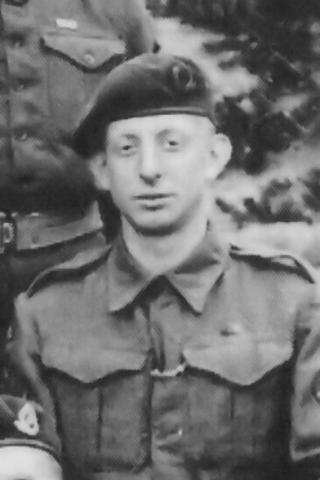Peter Dale volunteered for the Corps of Military Police on 17 Feb 1940 and transferred to the 1st Airborne Division Provost Company in early 1943.
He was attached to 1st Battalion The Border Regiment, for the invasion of Sicily, however things did not go according to plan as his post operation report records:
"Sir, I have to report that on the 9th July 1943 I was instructed to report to the Border Regiment for Police Duties on 'Scheme Horrific'. I was briefed by the Adjutant of the Regiment who explained that the destination was to be Sicily and that I would travel in one of the Rifle Company gliders and then join HQ Company on reaching the destination.
I was attached to Number 9 Platoon of 'A' Company who were allotted glider Number 103. We left Number 3 strip at Airfield 'D' about 1915 hours on the 9th July.
In company with many other aircraft we headed towards our objective at almost sea level, approx 200 feet. The sea crossing to within sight of our objective was uneventful except for a glimpse of the seaborne invasion fleet soon after sunset. Soon after sighting land at approx 2200hrs our glider cast off from the tug 'plane. This seemed a bit strange to me, as according to our briefing, we were to release at 1100 feet, 3000 yards from land, yet it was obvious that our height was less and the distance to shore considerably more. I thought about three to five miles.
I had no sooner checked my equipment when the Senior Glider Pilot, Staff Sergeant of the Army Air Corps, told us that we would be landing in the sea and that we were to discard our equipment and open all the doors. The glider landed in the sea fairly smoothly and we had ample time to escape from the cabin before it filled with water. On checking up on personnel whilst sitting on the wings, one Lance Corporal from The Border Regiment was found to be missing.
For a while the sea was very calm, but later a heavy swell came from the direction of the land and after about two hours the machine broke up, both wings and the tail coming adrift. To ease the weight on the waterlogged machine for non-swimmers, myself and another man, (name unknown to me), attempted to swim to the beach. After about half an hour, and due to heavy seas, I lost contact with my companion and continued swimming towards the faint outline of the coast. My last recollection was of seeing the sun above the horizon. I then found myself wrapped in blankets on board an invasion barge and the crew informed me that I had been picked out of the water at about 0730 hours. After landing the troops on the beach the barge returned to its Base Ship, SS Devonshire, where I was left in the care of the Medical Staff.
The Devonshire proceeded to Suez where, together with survivors of the Division, I spent two days in the Transit Camp. I spent a further 14 days in the 2nd ITD Camp Genifia, before returning to Company Lines at 1800 hours on the 1st of August."
Peter took part in the subsequent operations in Italy before returning to the UK shortly before Christmas 1943 in preparation for the liberation of North West Europe.
He attended Parachute Course 108 which ran at RAF Ringway from 20 to 29 March 1944, along with 5 other members of 1st Airborne Division Provost Company. The course notes record that Peter was "confident and capable, possesses fine spirit."
Peter took part in the Divisional assault to capture the Rhine Crossings at Arnhem as part of Operation Market Garden in September 1944. As part of No 4 Section, Peter was initially tasked with assisting in the marshalling and dispersal of men and vehicles on the Drop Zones and Landing Zones. Later he took part in maintaining the security and defence of the Divisional HQ.
By the end of the nine day battle arrangements were put in place to withdraw the remnants of the 1st Airborne Division across the Rhine to allied lines. Peter Dale and Ken Storry volunteered to stay behind and guard the German prisoners, while the rest withdrew. Later they were able to make their way down to the river and swam to the safety of the south bank.
He was subsequently awarded the Dutch Bronze Cross, reported in the London Gzette on 20 March 1947, and the citation records:
"After landing by parachute in the Arnhem area on 18 Sep, Cpl Dale, notwithstanding the fact that the DZ was swept by enemy fire, showed complete disregard for his personal safety by searching the area and rendering first aid to the wounded. Susbequently, on the night of 25/26 Sep, Cpl Dale volunteered to remain behind to guard some 200 Prisoners of War, and thus prevent any possibility of their escape interfering with the withdrawal of the Division. He remained under increasingly heavy fire. Only when the last parties were well clear at 2330 hours Cpl Dale made his way down to the river through enemy lines and swam to the south bank, as no boats were available. During the whole of the very exacting operation his coolness and cheerful disposition were an inspiration to those around him."
Peter was part of General Urquhart's escort to Norway to oversee the German surrender as part of Operation Doomsday and later served in Palestine, with 6th Airborne Division Provost, for his final deployment prior to demobilisation.
By ParaData Editor with the assistance of Peter Dale's daughter Janet Derepentigny.
Read More




Latest Comments
There are currently no comments for this content.
Add Comment
In order to add comments you must be registered with ParaData.
If you are currently a ParaData member please login.
If you are not currently a ParaData member but wish to get involved please register.